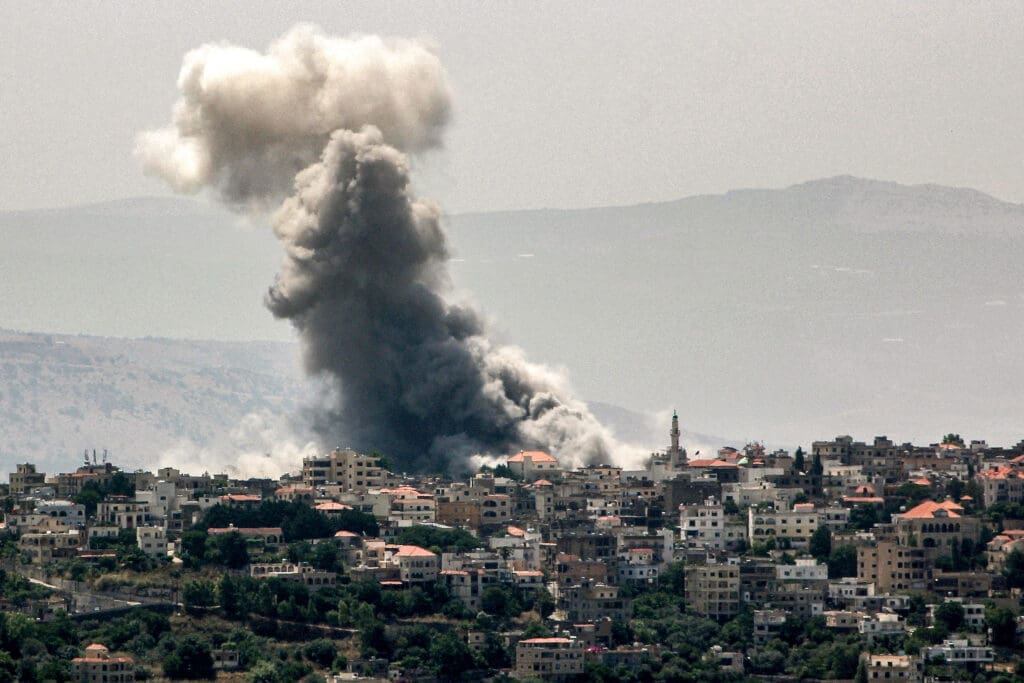In a speech a week after Israel’s assassination of Hezbollah military commander Fuad Shukr, the Lebanese movement’s Secretary-General Hassan Nasrallah remarked that “the resistance is not interested in using any victory over Israel for domestic political purposes.”
Ten months into Israel’s war of annihilation against the Gaza Strip and its campaign of killings in the West Bank, there is a total lack of discussion in Lebanon about the country’s pressing domestic issues. Hezbollah’s cross-border operations in support of Gaza, Israeli assassinations of the group’s fighters, and strikes by Hezbollah drones deep inside Israel all bring to mind the Arabic saying: “no sound can be heard over the sound of war.”
Meanwhile, the Lebanese state, its administration and institutions continue to collapse, and the entire public sector, across every ministry, has reached an unprecedented state of decay. The war has deepened divisions in Lebanon, which must be tackled as soon as the conflict is over. However long it lasts, one day the fighting will end and decision-makers will need to turn their thoughts to tackling what comes next.
Deep-Seated Problems
The Lebanese parliament’s last attempt to elect a president took place in June 2023, a little over a year ago. This ended, once again, in a stalemate between supporters and rivals of the two main Shiite parties, Hezbollah and Amal. Subsequently, a quintet of external parties formed by Saudi Arabia, Egypt, Qatar, France and the United States intervened to try to break the deadlock. It met with little success. Then the outbreak of the war on Gaza, and Hezbollah’s cross-border operations in support of Hamas, put the process of electing a president on hold, along with Lebanon’s other crises.
Publicly, Hezbollah has consistently linked a ceasefire in southern Lebanon with an end to the Israeli campaign in Gaza. This has kept the Lebanese public and political system on edge, with no say in Hezbollah’s military decision-making and subject to consequences totally outside their control. More subtly, however, Hezbollah leaders have drawn a line between a ceasefire and the election of a Lebanese president—with its preferred candidate on top, of course. Therefore, resolving the presidential crisis will depend on the outcome of the war and on developments on the political front.
Potential Trajectories
It is very unlikely that Hezbollah and Hamas on one side, or Israel on the other, will achieve the total extent of their war aims. All three parties to the conflict will emerge from this intact and likely in some altered political and military balance of power with the other. None will escape the consequences of the war, however, especially the people of Gaza who have endured unimaginable death and destruction at the hands of Israel’s war machine.
Israel’s military could destroy Beirut and flatten Hezbollah strongholds in the Dahiya district and the Bekaa Valley, but what would this achieve politically? It would neither wipe out Hezbollah nor its capabilities—and certainly not its popular base. The experience of the 2006 war is still fresh in Lebanese minds; Hezbollah has since swelled its ranks, built a stronger arsenal, and bolstered its battle-readiness.
Israel’s likely failure to achieve a decisive victory over Hezbollah will mean that its central demand on the Lebanese front—that Hezbollah withdraw between three and seven kilometers from the border—can only be achieved through negotiation. Such deliberations could be long and drawn-out, given the complex layout of the territory and disputes over everything from “Point B1” on the Mediterranean coast, to the villages of Ghajar and Al-Mari, up until the Shebaa Farms at the eastern end of the frontier.
One step that could realistically be achieved would see both sides commit to implementing United Nations Security Council Resolution 1701, which ended the conflict between Israel and Hezbollah in 2006, and enter negotiations over the border. Efforts by the American diplomat Amos Hochstein early on in the war may have laid the groundwork for a draft agreement that would see both sides begin implementing Resolution 1701.
Once the war is over, Hezbollah and its allies will also have two options regarding Lebanese internal politics.
On the one hand, they could conclude that the situation requires them to stick to their positions regardless of the outcome on the battlefield, which in any case will not break the current balance of power. Such a scenario would return Lebanon to the pre-October 7 status quo, characterized by deep political division, while leaving the country prey to intractable, domestic disputes that would cripple it and harm all its citizens.
The second option would be to seek an internal settlement to install a president with a majority in parliament—part of a package of compromises including over the prime minister and the form and function of the government. This could win Arab acceptance—if not support—and allow Lebanon to start tackling its political, economic and financial issues, in cooperation with Arab governments and the international community. Key to this would be cooperation with Saudi Arabia and Qatar, given that several such agreements already exist and simply need to be implemented.
Lebanon cannot possibly recover from its current situation until its authorities start undertaking necessary but potentially painful reforms. Such a process is a priority for Lebanon, which also needs to rebuild what Israel has destroyed; bring back Arab investors; revive the Paris I, II, III and Cedar agreements to secure international aid in exchange for reforms; and renegotiate with the International Monetary Fund (IMF).
Once the war is over, every day without a domestic settlement for Lebanon will cost the country dearly. Every delay will push the country closer to dissolving completely. This would risk failing to gather and unify the fragmented country—the worst possible outcome.


